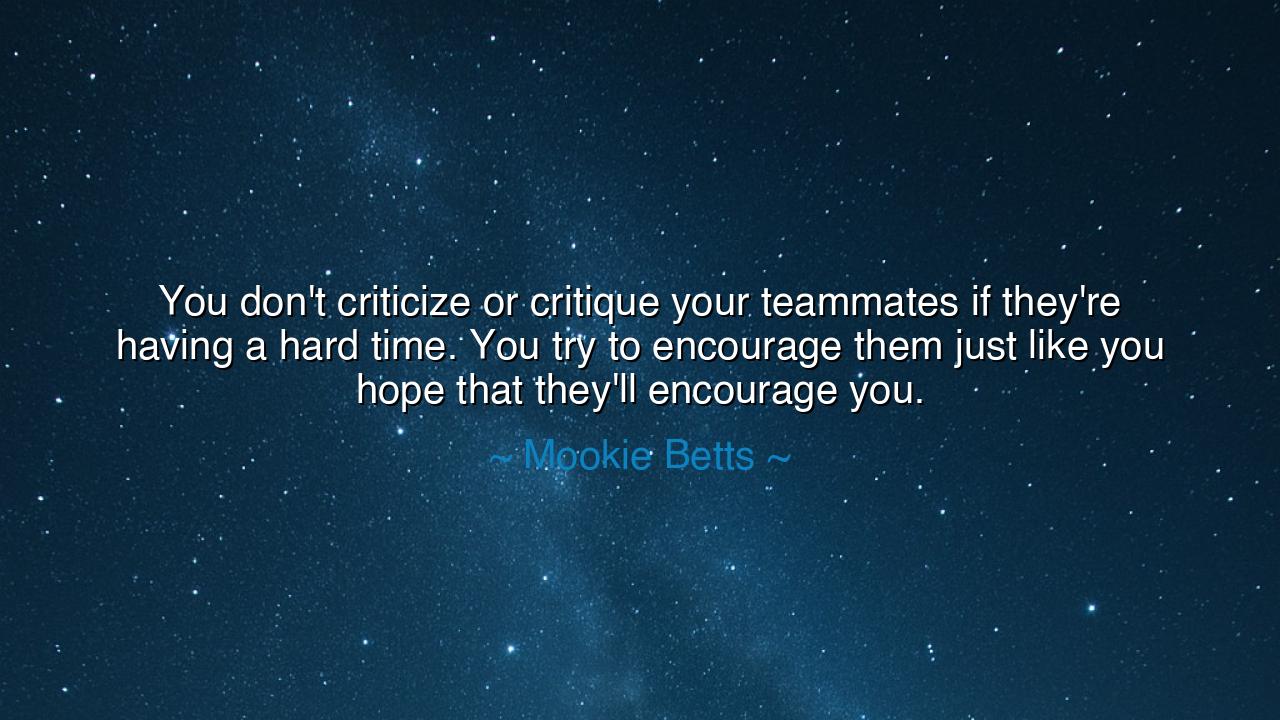
You don't criticize or critique your teammates if they're having
You don't criticize or critique your teammates if they're having a hard time. You try to encourage them just like you hope that they'll encourage you.






The words of Mookie Betts, “You don't criticize or critique your teammates if they're having a hard time. You try to encourage them just like you hope that they'll encourage you,” speak with the wisdom of brotherhood and the grace of humility. Though born in the world of sport, this truth belongs to all who walk together in life’s shared endeavors. It is a reminder that in times of struggle, what the human heart needs is not judgment, but encouragement; not rebuke, but understanding. Within these words lies the ancient teaching that unity is the foundation of strength, and compassion the secret of victory.
To the ancients, the idea of the team was sacred, though they did not always call it by that name. The Greek warriors of Sparta stood shield to shield, each one knowing that his own courage meant nothing if his brother faltered beside him. The Romans spoke of concordia, the harmony of souls that made a legion move as one. And so Betts’s wisdom echoes their own: when one falters, all are diminished; when one is lifted, all are strengthened. To encourage a companion in hardship is to honor the bond that binds you both — the shared humanity that makes triumph possible.
In the heat of competition, it is easy to forget this truth. Anger rises quickly; disappointment burns deep. Many men have lost not because of their enemies, but because they turned against one another. Mookie Betts, a master of his craft, reminds us that true leadership does not emerge in moments of glory, but in moments of failure. When a teammate’s spirit bends beneath the weight of defeat, the true warrior does not add to that burden — he becomes the shoulder that bears it. Encouragement is not weakness; it is the strength of empathy, the ability to see beyond performance and into the heart of a comrade.
Consider the story of Abraham Lincoln, who led a divided nation through its darkest trial. When his generals faltered or failed, he did not lash out in scorn. Instead, he spoke words of patience and faith, saying, “I will hold myself responsible.” He understood that unity born of compassion could achieve what force alone could not. Lincoln’s greatness was not in command alone, but in his unwavering encouragement — the belief that even those who stumble can rise again if given trust and support. Betts’s wisdom carries the same fire: the team that uplifts itself through kindness becomes unbreakable.
To encourage another is also an act of humility. It means to set aside one’s pride, one’s need to be right or superior, and instead choose the path of fellowship. Betts’s words remind us that every man, no matter how skilled, will one day stumble — and in that hour, he too will need a hand extended rather than a finger pointed. The circle of encouragement is eternal: today you lift another, tomorrow you are lifted. This mutual mercy is what sustains communities, families, and nations alike.
There is also wisdom here for the soul itself. For life, like sport, is a field of endless trials. None can stand alone forever; none can win without grace. The ancient sages taught that compassion is strength disguised as gentleness. The man who can soothe the anger of another, or rekindle hope where despair has taken root, wields a power greater than any sword — the power to transform hearts. Such a man multiplies courage wherever he walks.
So, let this teaching take root within you: Do not wound the weary. Do not shame the fallen. When you see a companion struggling, be the voice of faith they have forgotten to hear within themselves. Speak the words that lift, not those that crush. For in strengthening others, you strengthen yourself; in sharing hope, you build a fortress of trust that no hardship can tear down.
And when your own hour of difficulty comes — for it surely will — remember the spirit of Mookie Betts’s wisdom: that those who once received your kindness will stand beside you, unyielding, and say, “You lifted me, and now I lift you.” This is the eternal cycle of encouragement, the quiet miracle by which teams, families, and all of humankind rise together. It is, as the ancients would have said, the true art of victory — the triumph of hearts before the triumph of hands.






AAdministratorAdministrator
Welcome, honored guests. Please leave a comment, we will respond soon